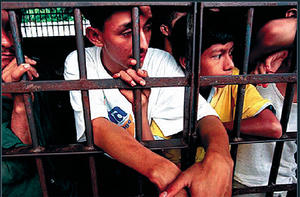Mexico: descent into chaosMexico cannot control border: WikiLeaks documents
The Mexican government has no control of its 577-mile border with Guatemala, where arms, drugs, and immigrant smugglers appear to have free rein, according to a U.S. diplomatic cable disclosed recently by WikiLeaks; the document says that Mexico does not have enough resources to patrol the border; in another recent document, U.S. diplomats voiced concerns that Mexican drug dealers could end up buying certain high-tech weapons that Russia had sold to Venezuela; such weapons are capable of shooting down U.S. combat helicopters

Guatamalans captured by Mexican immigration officers // Source: pulitzer.org
The Mexican government has no control of its 577-mile border with Guatemala, where arms, drugs, and immigrant smugglers appear to have free rein, according to a U.S. diplomatic cable disclosed recently by WikiLeaks.
The document says that Mexico does not have enough resources to patrol the border.
“Limited resources also undermine the effort: while there are 30,000 U.S. CBP officers on the 1,926-mile Mexican/U.S. border, only 125 Mexican immigration officials monitor the 577-mile border with Guatemala,” the document states.
“The weakness of the state (Guatemalan government), the pervasive violence, the widespread corruption, and the country’s strategic location for drug trafficking are creating a very dangerous cocktail.”
The state of lawlessness in Guatemala is such that residents rely on the Zetas instead of police to provide security, the released documents say. The Zetas, who formerly worked for the Gulf cartel, are reported to be making inroads in Chihuahua state.
The El Paso Times reports that several U.S. documents leaked to online whistleblower WikiLeaks mention diplomats’ interest in the drug trade and drug corruption in Latin America and the Middle East.
In another recent document, U.S. diplomats voiced concerns that Mexican drug dealers could end up buying certain high-tech weapons that Russia had sold to Venezuela. Such weapons are capable of shooting down U.S. combat helicopters.
The document said U.S. officials feared that members of the Revolutionary Armed Forces of Colombia (FARC) would obtain the weapons for the Mexican cartels.
FARC guerrilla members have been reported in Mexico for the past ten years and are suspected of helping one of the Mexican drug cartels kidnap a high-level official of the National Action Party, officials said.
Last month, the Colombian government asked Mexico for details about a shooting victim in Juárez who was suspected of belonging to FARC. In Colombia, officials said, the FARC has carried out hundreds of kidnappings and extortions, and collaborates with drug cartels to finance its operations.
Mexican drug cartels also have operations in Nicaragua, where U.S. diplomats were told that high-level Nicaraguan officials received suitcases filled with cash to protect drug-traffickers, and that judges in that country released drug dealers soon after they were arrested by Nicaragua’s police.
Other leaked U.S. documents have portrayed a Mexico that has lost control of some regions to drug cartels and struggles to develop an effective anti-drug strategy.
President Obama condemned WikiLeaks’ disclosure of sensitive U.S. diplomatic cables, and called Mexican president Felipe Calderón on Saturday to assure him the leaks would not interfere
